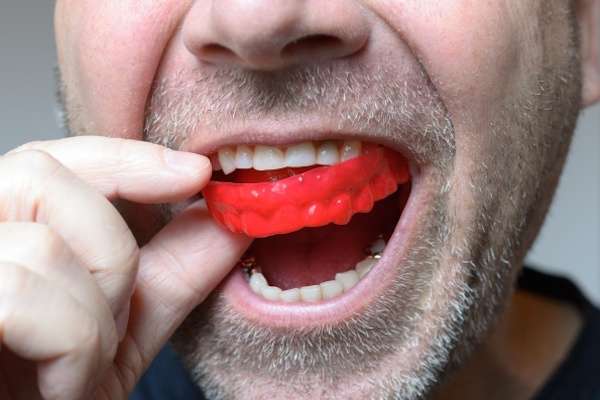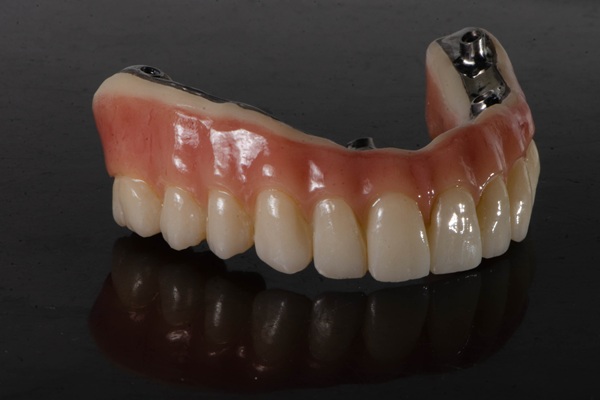 A patient's dentist may recommend custom mouth guards to reduce the effects of bruxism and help prevent long-term tooth damage. Bruxism, or teeth grinding, is a common cause of headaches, jaw pain and similar symptoms. It also can increase a patient's risk for temporomandibular joint (TMJ) syndrome, a condition that may cause jaw joint pain, trouble opening or closing the mouth and difficulty chewing food.
A patient's dentist may recommend custom mouth guards to reduce the effects of bruxism and help prevent long-term tooth damage. Bruxism, or teeth grinding, is a common cause of headaches, jaw pain and similar symptoms. It also can increase a patient's risk for temporomandibular joint (TMJ) syndrome, a condition that may cause jaw joint pain, trouble opening or closing the mouth and difficulty chewing food.
How can patients tell if they need a mouth guard?
While there are conscious steps to take for patients who clench or grind their teeth while awake, those who grind their teeth while asleep may not even be aware that they are doing it. There are several things that can let patients or their dentist know that bruxism is a problem.
Excessive tooth wear
In many cases, a patient's dentist will notice extreme wear on the teeth in a case of bruxism. To prevent further damage and preserve the teeth, the dentist may recommend a custom mouth guard.
Headaches upon waking
Having a headache when waking up is a common sign of bruxism. The prolonged tension resulting from grinding the teeth at night often result in painful headaches.
Pain in the TMJ
The temporomandibular joint (TMJ) often becomes tender to the touch in patients who grind their teeth at night. In some cases, joint pain will be so severe that the patient has trouble open and closing the mouth normally. Bruxism is not the only cause of TMJ pain, but it is a common one.
How does a mouth guard protect the teeth?
Many patients may not think that bruxism is particularly dangerous. However, according to Dentistry Today, bruxism often reaches a force of up to 500 pounds per square inch (psi). This force is many times the force of normal chewing — even biting down on dense, crunchy foods like carrots exerts a force less than 30 psi.
This repeated force can cause damage to the teeth. In some cases, patients with bruxism end up causing severe damage to tooth enamel. Since enamel is the protective layer, patients with bruxism may eventually experience increased sensitivity and even cavities.
Mouth guards provide a layer between the jaws that protects the surfaces of the teeth from further damage. They may not completely stop bruxism, but they do protect the patient's teeth from continually being worn down. Guards designed for night use are custom-fitted by a dentist based on an impression of the patient's teeth. They are usually comfortable and low-profile, and they do not interfere with breathing. Most patients become accustomed to sleeping in mouth guards fairly quickly.
Check out what others are saying about our dental services on Yelp: Mouth Guards in Aurora, CO.
Conclusion
For patients who grind their teeth at night or suspect they do, a good first step to dealing with the problem is simply talking to a dentist. The dentist can examine teeth for signs of bruxism. If mouth guards are needed, a custom-fitted option keeps the patient comfortable and reduces the often-painful side effects of teeth grinding.
Request an appointment or call Alameda Dental at 303-343-7072 for an appointment in our Aurora office.
Recent Posts
An All-on-4® system is a practical and efficient solution to losing a full arch of teeth. This type of restoration has four implants. These implants support permanent overdentures. All-on-4 implants are ideal for patients who are transitioning to dentures. With these dental appliances, you can enjoy the stability of implants built into dentures. If you…
If you have damaged teeth, you can use a process called dental bonding to fix them. This is a quick, easy, and cheap way to repair your damaged teeth. Your family dentist can perform the procedure and reinvigorate your smile!Anyone suffering from minor cosmetic damage is a candidate, including people whose teeth are chipped, cracked,…
Dental veneers are a popular treatment option used for both restorative and cosmetic purposes. They are versatile in the sense that they can be used to cover stained teeth, repair chipped teeth and even lengthen teeth that are too short. While veneers are a popular choice for many patients, they are newer to dentistry compared…


